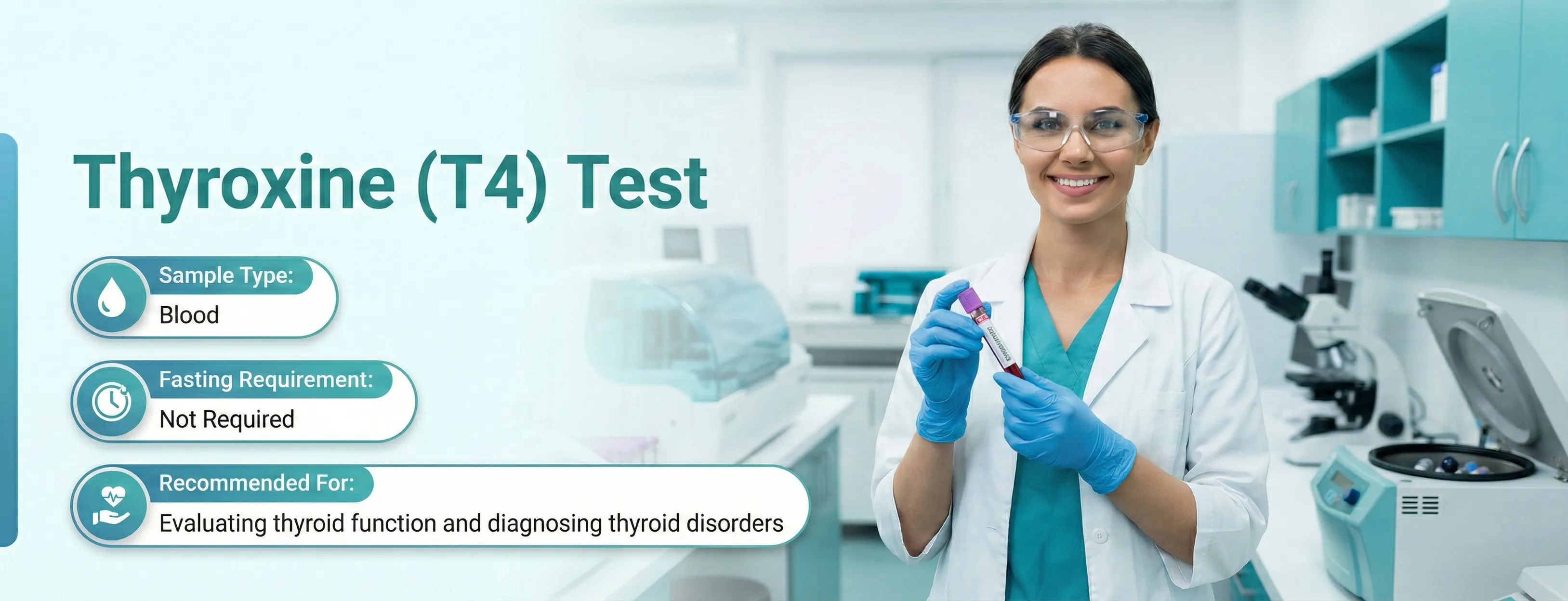246+ orders placed in your location
100% NABL & ISO Certified Lab • 100% Accurate Reports
Thyroxine (T4) Test
Thyroxine, Tetraiodothyronine, Total T4 concentration, Thyroxine Screen
- SummaryThe Thyroxine (T4) test measures the level of T4 hormone in the blood, which is essential for regulating metabolism, energy levels, and growth. It helps diagnose thyroid disorders such as hypothyroidism or hyperthyroidism. The test is performed using a blood sample, and fasting is not required, although morning samples may be preferred.Read more
- Reports Within13 HrsView Sample Report100% NABL & ISO Certified Labs
- SampleBlood
- AgeAll Age Group
- GenderMale and Female
- FastingNot Required
PharmEasy Promises
Know More About The Test
A quick info on Thyroxine (T4) Test
Overview
Metabolism is how the human body generates energy. Metabolism, or the conversion of food into energy, is assessed by the basal metabolism rate (BMR). The thyroid hormones, including T4, have a direct impact on the BMR levels. T4 hormone by the thyroid gland plays a vital role in metabolism, growth, and development.
The T4 test is used in the diagnosis of clinical as well as subclinical thyroid disorders.
The thyroid gland is a type of endocrine gland at the lower front part of the neck. It regulates several bodily functions, including metabolism, energy production, and mood. The thyroid gland produces T3 and T4 under the effect of thyroid-stimulating hormone. T3 and T4 hormones are produced by the thyroid gland using iodine obtained from meals.
T3 and T4 are present in the blood in two forms:
- Bound form
- Freeform
One blood test that are part of a T4 test report:
- Total T4
Total T4 measures the total amount of tetraiodothyronine in the blood. This T4 test report includes the amount of T4 bound to blood proteins.
These proteins help in the transport of the hormone:
- Free T4
Free T4 test report measures the thyroxine that is not bound to proteins. Free T4 is the portion of T4 that is available to other body cells for functioning. If the symptoms point to a thyroid problem, the doctor may prescribe a T4 test.
Hyperthyroidism is a condition in which the thyroid is more active. Hyperactive thyroid causes weight loss, a rapid heart rate, and increased perspiration.
Hypothyroidism is a condition characterised by an underactive thyroid gland. It can result in weight gain, weariness, and a feeling of being cold, and can cause medical complications if left untreated. The proper diagnosis and timely treatment are essential to avoid complications in thyroid disorders.
Thyroid diseases are endemic in certain parts of India where there is a lack of naturally available iodine. Goitre or hyperthyroidism can develop due to a lack of iodine in the diet. T3 and T4 is a frequent deficit in the sub-Himalayan region. It is a crucial test to have during and before pregnancy since poor thyroid function might impact the growth of the foetus.
Risk Assessment
Hypothyroidism, Hyperthyroidism, Hashimoto's thyroiditis, Thyroid cancer
What does this test detect?
The T4 test measures the levels of hormones in the blood sample. The doctor recommends the T4 test procedure in people with symptoms of low or high thyroid hormones.
Indications for Thyroxine (T4) Test
The T4 test is indicated if a person is experiencing the following symptoms:
- Unexplained weight loss or weight gain
- Lack of energy or restlessness
- Constipation or diarrhoea
- Oversensitive to cold or heat
- Hairfall, brittle hair
- Swelling, lump in the throat
- Laziness
- Cramps in the hands and feet
- Tremors in the hands
- Puffiness
- Bulging of the eyes
- Insomnia or excessive sleepiness
- Anxiety
- Irritability
- Mood swings
- Depression
- Increased or decreased heartbeat
- Irregular menstrual cycles
T4 test along with T3 and TSH is advised for people with a high risk of thyroid disorder. It includes:
- People with a family history of autoimmune illnesses
- People with diabetes
- People who have had neck surgery, the thyroid gland might be affected in postsurgical conditions
- People undergoing radiation therapy or chemotherapy too could be at risk of thyroid dysfunction
- People with psychiatric disorders need screening for thyroid profile
- Newborn babies with chromosomal anomalies
How frequently should you take this test?
If the T4 test results confirm a diagnosis, start medicines after consulting an endocrinologist. Like most chronic diseases, high or low levels of T4 treatment takes time. As a result, the doctor will most likely repeat T4 values every three months to monitor the levels and keep an eye on the treatment strategy.
This three-month check-up will reveal whether the amount has increased, decreased, or remained the same. The doctor repeats this test annually if the T4 test results were in the healthy range in the previous report.
Test Preparation
Before the Test
Generally, there's no need to prepare for an T4 test. However, if this blood test is done at the same time as another that needs certain preparation, your doctor might recommend avoiding certain foods. Consult your doctor for advice for the best outcome.
During the Test
A tiny amount of your blood will be taken from a vein in your arm. Here are the things to expect during the procedure:
- The likely puncture site will be cleaned with an antiseptic solution.
- A band will be wrapped around your arm to make the veins more visible.
- A needle will be inserted into the vein to collect the blood. This might cause a quick pinch for a few seconds.
- The blood will be put into a vial/small tube, and with a label containing your information.
After the Test
After the blood is drawn:
- A bandage will be put on the puncture area to stop any bleeding.
- It's normal to have a little bit of bruising. A rare side effect could be feeling lightheaded. If you feel dizzy, sit down for a few minutes.
- If you notice any bleeding, pain, or a rash at the site of the needle, please get in touch with your doctor
Parameters
The T4 test chart includes two parameters. The T4 test values give an idea about the decrease and increase in the T4 values.
The T4 test chart includes
- Total T4
The T4 test result gives an idea about the functioning of the thyroid gland. If the value of the T4 test chart is on the higher side or lower side, it is an indicator of a thyroid disorder.
Ranges
The normal levels of T4 are mentioned in the table below:
Thyroxine (T4) | Results |
Total T4 | 5.53-14.00 µg/dL |
The T4 normal range in pregnancy:
Trimester | Results |
First trimester | 0.95–1.53 ng/dL |
Second trimester | 0.87–1.45 ng/dL |
The T4 normal range in newborns:
Age | Results |
6 Days | 11-32 ng/dL |
6-13 days | 11.5-28.3 ng/dL |
14 Days and above | 12-22 ng/dL |
The normal values and reference ranges of the test may vary from lab to lab. Please refer to the ranges mentioned in the report and consult a doctor to understand the interpretation of lab reports.
Test Result Interpretation
The T4 test values are in two forms:
- Total T4
- Free T4
Various metabolic dysfunctions begin due to increased or decreased amounts of T4 in the blood. The doctor may not be able to diagnose the underlying issue based only on abnormal T4 test values. T4 levels might potentially be affected during pregnancy. The obstetrician may recommend more tests if T4 levels are abnormal during pregnancy.
An abnormal level of T4 means some underlying cause that is affecting T4 values.
A low value in the T4 test means:
- Dietary issues: Iodine is essential for the production of T4. Diet lacking in iodine can affect T4 synthesis.
- Prolonged fasting: Fasting involves a diet that does not contain salt. Salt is a rich source of iodine. Prolonged fasting affects overall thyroid hormones due to the lack of iodine.
- Malnutrition: Malnutrition is a condition where the person lacks both major and minor nutrients in their diet. The deficiencies of nutrients such as iodine, iron, selenium, and zinc may affect T4 values.
- Iodine deficiency: Iodine is an essential element for thyroid hormone production. The human body does not synthesise iodine. Iodine has to be consumed through food substances in the diet. Decreased amount of iodine in the body leads to a reduction of T4 levels.
- Hypothyroidism: Hypothyroidism is a condition where thyroid production of thyroid hormones T3 andT4 becomes low. In hypothyroidism, the thyroid gland is in an underactive state. Low thyroid hormones reduce the overall basal metabolic rate.
- Pituitary disorders: Secondary hypothyroidism can develop due to pituitary disorders. The pituitary gland secretes a hormone called thyroid-stimulating hormone (TSH). TSH is essential for the production of T3 and T4.
Lack of TSH could be a potential cause for lowered T4 levels. Increased T4 levels mean some underlying cause that is affecting T4 levels.
Elevated values in the T4 test mean:
- Hyperthyroidism: Hyperthyroidism is a condition where the thyroid gland produces an excess T3 and T4. Hyperthyroidism increases the overall basal metabolic rate.
- Thyroiditis : Thyroiditis is a condition characterised by swelling and inflammation of the thyroid gland. Thyroiditis can increase or decrease thyroid hormone production. An advanced phase is known as thyrotoxicosis.
- Toxic multinodular goitre: Toxic multinodular goitre is a disorder characterised by enlargement of the thyroid gland due to iodine deficiency or excess iodine or toxin. Some autoimmune diseases could also be a cause of multinodular goitre. The goitre affects levels of thyroid hormones.
- Excess iodine: consumption of iodised salt affects the thyroid gland and its function of producing thyroid hormones T3 and T4.
- Increased dose of thyroid replacement medication: In low T3 and T4 levels, people are advised with hormone replacement therapy for a short duration. These therapies, if prolonged or if taken in high doses, can lead to low T4 levels.
Risks and Limitations
The T4 test is a commonly done blood test with rare risks of complications. See your doctor if you notice:
- Persistent bleeding at the site of needle-insertion.
- The skin where the needle went in becomes red, swollen, or hurts.
Limitations of the test
- The accuracy of the test could be affected due to equipment or human mistakes.
- Misinterpretation of the markers leading to inaccurate reports.
Was This Test Information Helpful?
Please rate your experience
References
Health packages containing 'Thyroxine (T4) Test'
People Also Ask
What do T4 levels indicate?
What is the T4 test used for?
What happens if T4 is low?
Does low T4 cause weight gain?
What is a bad T4 level?
Have any doubts? Ask us.
Ask us anything about the Thyroxine (T4) Test to understand it better
We provide trusted, expert-curated health content to support better awareness,prevention, and care.
Backed by experienced doctors, medical experts, and strict editorial standards.


